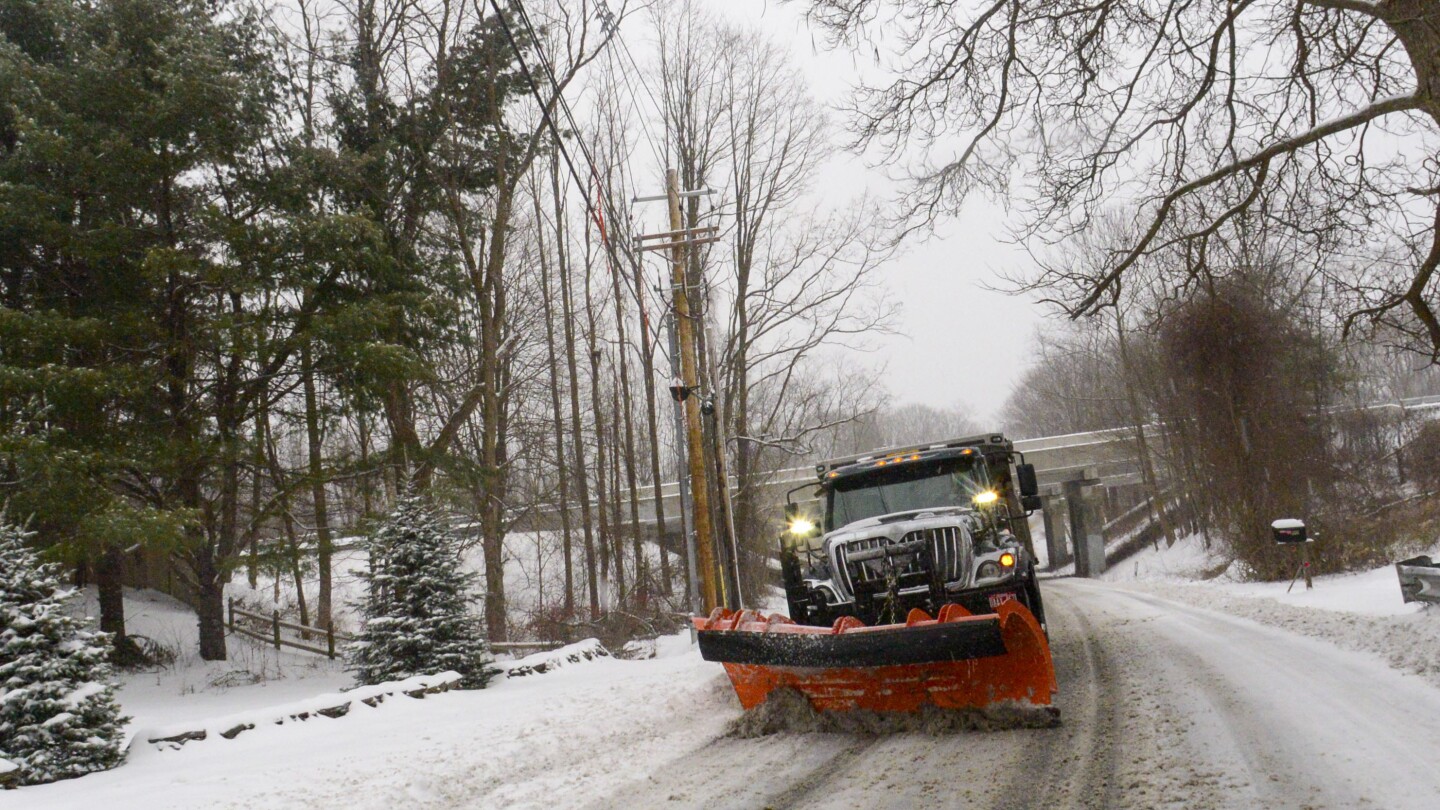BOSTON (AP) — It may officially be spring, but New England was battling a wintry weather combination across the region Saturday with more than a foot of snow expected in ski country, and rain, wind and possible flooding in southern areas and along the coast.
In Maine the National Weather Service warned of a treacherous travel day with an increase in ice forming inland from the coast, on top of snow or sleet that had already fallen.
Farther inland forecasters called for anywhere from 1 to 2 feet (30 to 61 centimeters) of snow across the mountains in western Maine and areas north and in New Hampshire’s White Mountains, according to Maura Casey, a lead forecaster for the weather service, based out of Gray Maine.
In the lakes region of New Hampshire up to Maine totals were expected to be somewhat lower at 6 inches up to a foot (15 to 30 centimeters) with sleet and freezing rain mixing in.
“There’s a pretty steep cutoff with lower amounts near the coast and higher amounts in the mountains,” Casey said.
Across Connecticut, New York City, Rhode Island and Massachusetts, the storm was expected to remain largely a rain event, with some freezing precipitation in the earlier part of the day in western and central Massachusetts before turning to all rain.
The heaviest rain was expected in the late afternoon and evening spreading across Connecticut and western and central Massachusetts from 4 p.m. to 7 p.m. and across Rhode Island and eastern Massachusetts from 7 p.m. to 10 p.m. The rain could linger over Cape Cod and Nantucket until midnight.
“Overnight dry weather will give way to sunshine,” said Frank Nocera, lead forecaster for the National Weather Service in Norton, Massachusetts. Despite the sun, Sunday was expected to be blustery with temperatures chillier than average for late March, he said.
Fans of skiing welcomed the snowfall.
At Loon Mountain in New Hampshire’s White Mountains, skiers were looking forward to the 12 to 20 inches (30 to 51 centimeters) of new snow the storm was expected to drop on top of a foot (30 centimeters) earlier this week.
“The storm is great. It’s brought a lot of skiers out to the mountain today,” said Kevin Bell, vice president of marketing for the resort. “This could be the biggest snow we’ll see all year. It sets us up for a really good spring. The more snow New England gets, the better for us.”
The Mount Washington Avalanche Center issued an avalanche warning along the White Mountain’s Presidential Range until 7 a.m. Sunday.
“Very dangerous avalanche conditions exist. Natural and human-triggered avalanches large enough to bury people are very likely,” the center said. “Some avalanches will be large enough to snap trees or destroy a house and may run far into areas previously considered safe.”
The storm should be completely out of the New England region by Sunday morning.
There was a threat of flooding across the region including in far southern New Hampshire, according to the weather service.
The rain could also produce flooded rivers in Rhode Island and southeast Massachusetts. The weather service issued flood watches across the tri-state area of Connecticut, New Jersey and New York.
In New York City, a flood watch and wind advisory were in place until 2 a.m. Sunday.
Flooding impacted subway service, shutting down a section of the Staten Island Railway in both directions. Flooding also closed part of the Cross Island Parkway in Queens, and police warned motorists about standing water on highways throughout the city. The storm delayed the opening of Coney Island’s Luna Park, home to the famous Cyclone and Thunderbolt roller coasters.
Forecasters predicted possible wind gusts of 45 to 50 mph in New York. A winter storm warning was in place north of Albany, with more than a foot of snow expected over the Lake George region, the southern Adirondack Mountains and the southern Green Mountains.
In the West, a winter storm warning was in effect until Sunday morning for parts of the Sierra Nevada, where up to 4 feet (1.2 meters) of snow and winds gusting in excess of 80 mph (128 kph) were possible on the highest mountain peaks, the weather service said.
About a foot (30 centimeters) of snow had fallen by Saturday morning north of Lake Tahoe, along with about a half-foot (15 centimeters) at Dodge Ridge Mountain Resort north of Yosemite National Park. A 91-mph (147-mph) wind gust was recorded at Mammoth Mountain, south of the park near the California-Nevada line.
The National Weather Service’s Sacramento office said snow could fall at rates of up to 1 to 2 inches (2.5 to 5 centimeters) per hour on the Sierra’s west slope west of Lake Tahoe, with up to 2 feet (61 centimeters) possible at elevations as low as 4,500 feet (1,370 meters).
The storm making its way through New England comes at the end of a winter season in some areas of the Northeast, including Boston, that saw little snow and warmer temperatures.
In South Florida, severe thunderstorms Friday night delayed departures at the Miami International Airport during the busy spring break season, suspended a popular electronic music festival and disrupted matches at a high-profile tennis tournament.
And in Virginia’s Shenandoah Valley, crews battling wildfires this week got an assist from some wet weather.
“Without a doubt the rain is helping,” said Cory Swift, a spokesperson for the Virginia Department of Forestry.
___
Associated Press writers Susan Haigh in Norwich, Connecticut, and Scott Sonner in Reno, Nevada, contributed to this report.

